MusiQ
The Spectrum - Samanthas Mine
Table of Contents
Download
Filename: the-spectrum-samanthas-mine.rar- MP3 size: 19.6 mb
- FLAC size: 133.2 mb
Tracks
| Track | Duration | Preview |
|---|---|---|
| Samantha's Mine | 2:20 | |
| Tables And Chairs | 2:40 | |
| Saturday's Child | 2:30 | |
| London Bridge Is Coming Down | 3:05 |
Video
Spectrum - Samantha's Mine (1967)
The Spectrum - Saturday's Child (1967)
Images
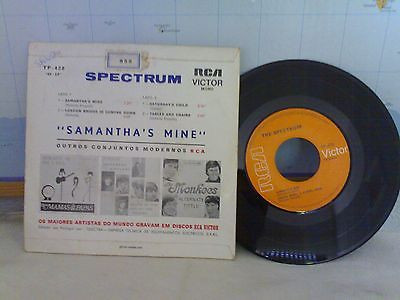
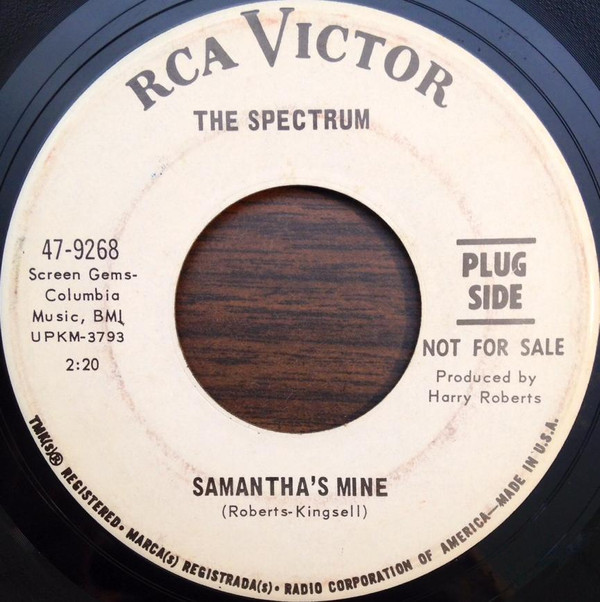
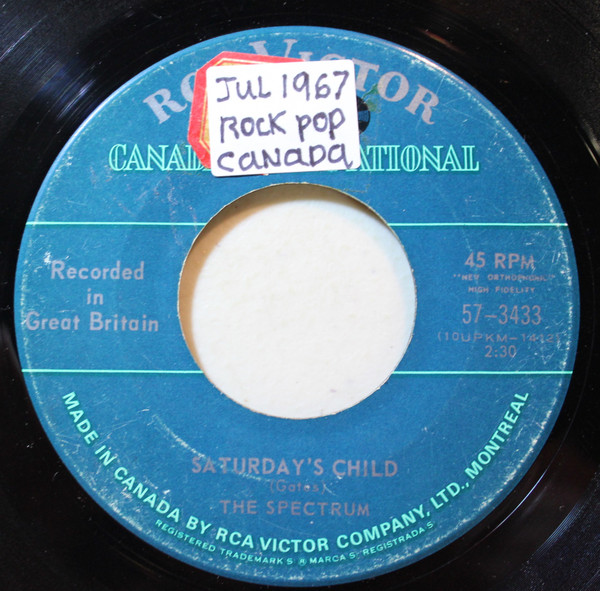
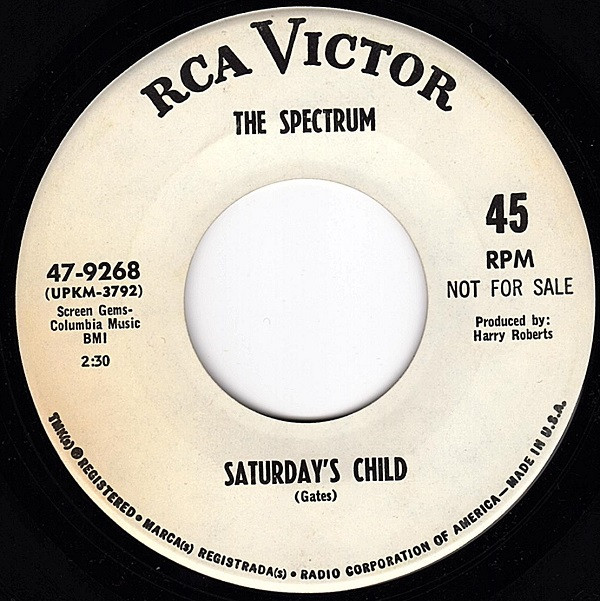
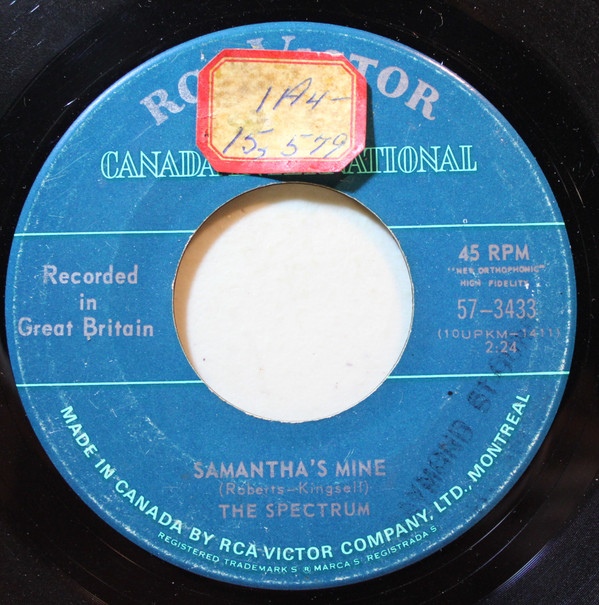
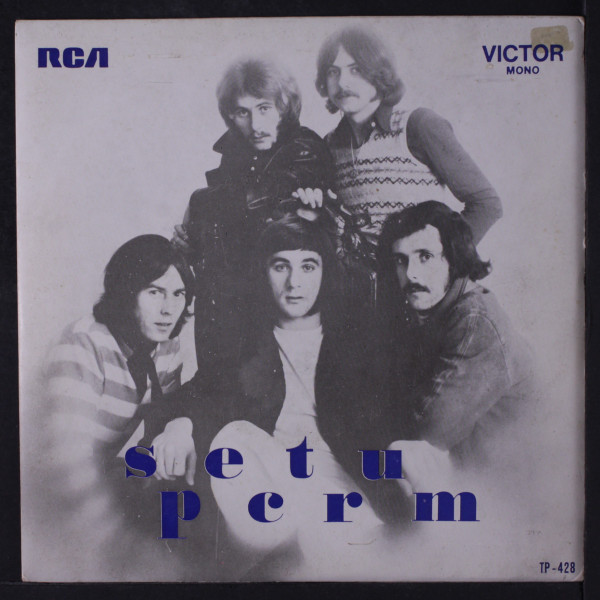
Catalog Numbers
- 47-9268
- 57-9268
- TP 428
Labels
RCA VictorListen online
- écouter en ligne
- online luisteren
- kuunnella verkossa
- lytte på nettet
- ascolta in linea
- escuchar en línea
- lyssna på nätet
- online anhören
- ouvir online
Formats
- Vinyl
- 7"
- 45 RPM
- Promo
- Single
- EP
- Mono
Companies
| Role | Company |
|---|---|
| Published By | Screen Gems-Columbia Music |
| Manufactured By | Telectra |
Credits
| Role | Credit |
|---|---|
| Producer | Harry Roberts |
Notes
- Label variation with (UPKM-3792) and (UPKM-3793) directly underneath the catalog number.
- White-label promo "NOT FOR SALE".
- NOT FOR SALE
Barcodes
- Rights Society: BMI
- Label Code: TP 428 A
- Label Code: TP 428 B
About The Spectrum
English pop-psychedelia band of the late 1960s.
The Spectrum were mostly known in Europe, despite being a British band -- they were actually a manufactured group, reportedly put together by British RCA to see if they couldn't come up with a U.K. equivalent of the Monkees, but they never had any luck in their own country, despite exposure on a popular children's television show for part of its run and getting a single picked up by a top pirate radio station.
Tony Atkins (lead guitar), Colin Forsey (vocals), Bill Chambers (organ), Tony Judd (bass), and Keith Forsey (drums) made their debut with a single of "Samantha's Mine" b/w "Saturday's Child," issued in early 1967; it became much more popular in Spain (where it reached the number one spot) than it was in England.
Their second single, "Portabello Road," was picked up by Radio London, the top pirate radio outlet in England, and played very heavily, but it failed to chart.
But their third single, "Headin' for a Heatwave," hit number one in Spain, and their fifth single, a cover of "Ob-La-Di, Ob-La-Da," reached the top spot in Germany during 1968.
The group was also featured in the closing credits of the Gerry Anderson-produced series Captain Scarlet & the Mysterons, singing the title song, but this exposure failed to get them any significant sales and the song was never issued commercially -- ironically enough, their presence on the title theme even gave the group a bit of exposure in America (where the series was popular and ran for years in reruns, and where their singles had never been released), of which they were never able to take advantage.
By 1968, Peter Wood had replaced Chambers on the organ, and the following year Atkins switched to bass and Colin Forsey became their rhythm guitarist while John Beattie took over on lead guitar.
Two additional singles were forthcoming from the group on RCA, along with an LP entitled The Light Is Dark Enough, after which the group moved to Parlophone for one last single before splitting up.
This early record of mixed success seemed to be nothing up a hiccup in the career of Keith Forsey, who went on to play drums with numerous other artists, in addition to becoming a major songwriter (including co-authoring "Flashdance (What a Feeling)" and "Don't You Forget About Me") and producing Billy Idol, Nina Hagen, the Pointer Sisters, and the Psychedelic Furs, among numerous other artists, and writing several movie soundtracks.n
Name Vars
- Spectrum
Aliases
- Le Group 5
Members
- Keith Forsey
- Tony Atkins
- Anthony Judd
- Bill Chambers
- Colin Forsey
Comments
Someone told me it's about a colliery belonging to Samantha. Probably not.
my first love was a kindred soul named Samantha, wherever she is I hope she's happy and fulfilled
I would like to dedicate this rare beauty to the excellent and very knowledgeable UK DJ, Christopher ‘Musky’ Musk - he tipped me off that it was a great song, and he was absolutely right.
Única!!
Extrañamente,esta cancion de pop sicodelico vocal ingles,tuvo mucho exito en España,donde publicaron muchos discos
Gracias. Lo comparto.
Gran cancion
Someone knows the lyrics of this song?
Alguien puede poner la letra?
Spectrum is Green.
Played a lot on Big L radio London
Pleasant harmonies
The Spectrum never recorded a single version of the Captain Scarlet theme song and I could never understand why not.
did anybody else get here through captain scarlet?
One to whistle on the way back from the unisex hairdressers. LOL.
me pregunto ¿cómo me podría hacer con la letra de la canción?
Believe it or not, the lead singer from this band, Colin Forsey, is a good friend of mine nowadays, and has his own recording studio too here in El Reno, Oklahoma. Check out his music page on Facebook, he's doing great 50 years later.
Es una canción preciosa y muy nostálgica. Me trae recuerdos de guateques, de amores platónicos, de paseos por Madrid sin un duro...
Bill Chambers (keyboards) was a very good mate of my mate's Dad and was Best Man at his wedding!
This is kinda of a stupid question, but so it never made to the U.S.?
I "discovered" this song on an old 45 as a teenager in the early 80s. Used to play it loud in the car. My friends thought I was strange :-)
